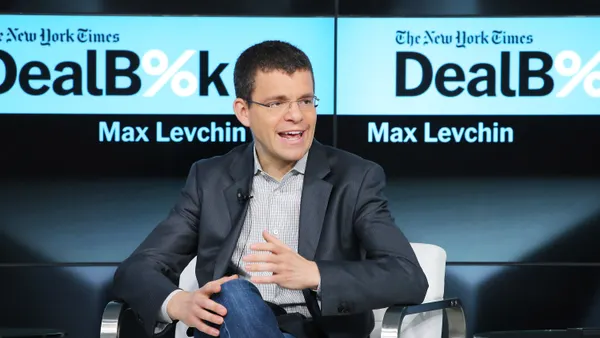Dive Brief:
- Fiserv Chief Executive Mike Lyons announced “a critical and necessary reset” for the payments giant on Wednesday, with a management shakeup and three new directors as the company and conceded a need for deep changes. Lyons said Fiserv would renew its focus on “integrity, fairness, execution, accountability and client service” after posting financial results he called “disappointing.”
- Fiserv appointed Paul Todd, former chief financial officer at Global Payments, as its new financial chief, replacing Bob Hau, effective Friday, according to a Wednesday press release. It elevated Chief Operating Officer Takis Georgakopoulos to co-president, and hired former Optum Financial Services CEO Dhivya Suryadevara as co-president. Fiserv will also add three new directors on Jan. 1.
- “We are shifting our strategic focus and our culture to prioritize sustainable, client-focused opportunities,” Lyons said in remarks opening a quarterly call with analysts, adding that “this pivot will negatively impact near-term results.”
Dive Insight:
The fundamental Fiserv changes come after a “rigorous analysis” of the company over the six months he’s been in the top job, Lyons said on the call. He assumed the CEO role in May, after the U.S. Senate confirmed former leader Frank Bisignano to lead the Social Security Administration.
The new executives and directors “will help catalyze these efforts to achieve our standards of excellence and enable a customer-centric culture,” Lyons said in the release.
The changes come after Milwaukee-based Fiserv’s third-quarter earnings report Wednesday fell significantly short of analysts’ sales and net income projections. Net income climbed 40% to $792 million as revenue rose 1% to $5.26 billion, according to the company’s earnings release.
“Our current performance is not where we want it to be nor where our stakeholders expect it to be," Lyons said in the earnings release. "With the actions being announced today, Fiserv will be better positioned to drive sustainable, high-quality growth and reach our full potential.”
Fiserv had embedded unrealistic assumptions in its guidance regarding volume growth, sales activity and broad productivity improvements, “all of which would have been objectively difficult to achieve, even with the right investment and strong execution,” Lyons said.
Fiserv shares plunged 43% in trading Wednesday morning as investors digested the dramatic financial turnabout. The stock decline is the company's largest since it went public in 1986, Bloomberg News reported.
The CEO also said that in recent years Fiserv had deferred investments and cut some costs to improve short-term profit margins. Those decisions “are now limiting our ability to serve clients in a world-class way, execute product launches to our standards and grow revenue to our full potential,” he said.
A turbulent economy in Argentina, an important Fiserv market, accounted for part of the shortfall, executives said on the call. The country had accounted for sizable growth in the past.
Fiserv is also making changes to its Clover point-of-sale business, which had drawn merchant complaints as the company moved to aggressively expand its use. Lyons said Clover managers are undertaking “a full overhaul of the client experience as they engage with us. Operationally, we can be more excellent.”
Fiserv’s profit outlook – based partially on Clover growth rates that didn’t materialize when many merchants rebelled against the newer system’s costs and complexities – led to a class action investor lawsuit against Fiserv in July. That complaint is pending in a New York federal court, awaiting a judge’s ruling on which plaintiff will serve as the lead.
Prior to the company’s financial baseline reset, Fiserv executives had told investors to expect double-digit earnings growth. The fiscal impacts of the business revamp is likely to yield diminished financial results much of next year, with results beginning to normalize to prior comparisons by the end of 2026, said Todd, who has been a “special adviser” at Fiserv for several weeks.
The company cut its financial guidance, projecting 2025 earnings of no more than $8.60 per share, compared to its prior view of $10.15 to $10.30 per share, with revenue growth no higher than 4%, compared to previous guidance of 10%.
The financial revisions and guidance overhaul dent Fiserv’s credibility and suggest the operations “becomes a multi-quarter turnaround with significantly diminished visibility,” William Blair analysts Andrew Jeffrey and Cristopher Kennedy wrote Wednesday in a client note.
“We encourage investors to refocus long-term fintech investments on better-positioned names with greater financial visibility and management credibility,” they wrote, adding that the third-quarter results are “difficult to explain and harder to defend.”
Fiserv’s new directors all come with deep experience in finance and financial management, underscoring the company’s effort to bolster its finance functions.
The directors include: Gordon Nixon, the former CEO of Royal Bank of Canada; Céline Dufétel, the CFO at investment firm Bridgewater Associates and the former president and chief operating officer at Checkout.com; and Gary Shedlin, the vice chairman of BlackRock and a former financial chief at the investment management firm.
Nixon will become the board’s independent chairman. Current directors Doyle Simons and Kevin Warren will leave the board.













